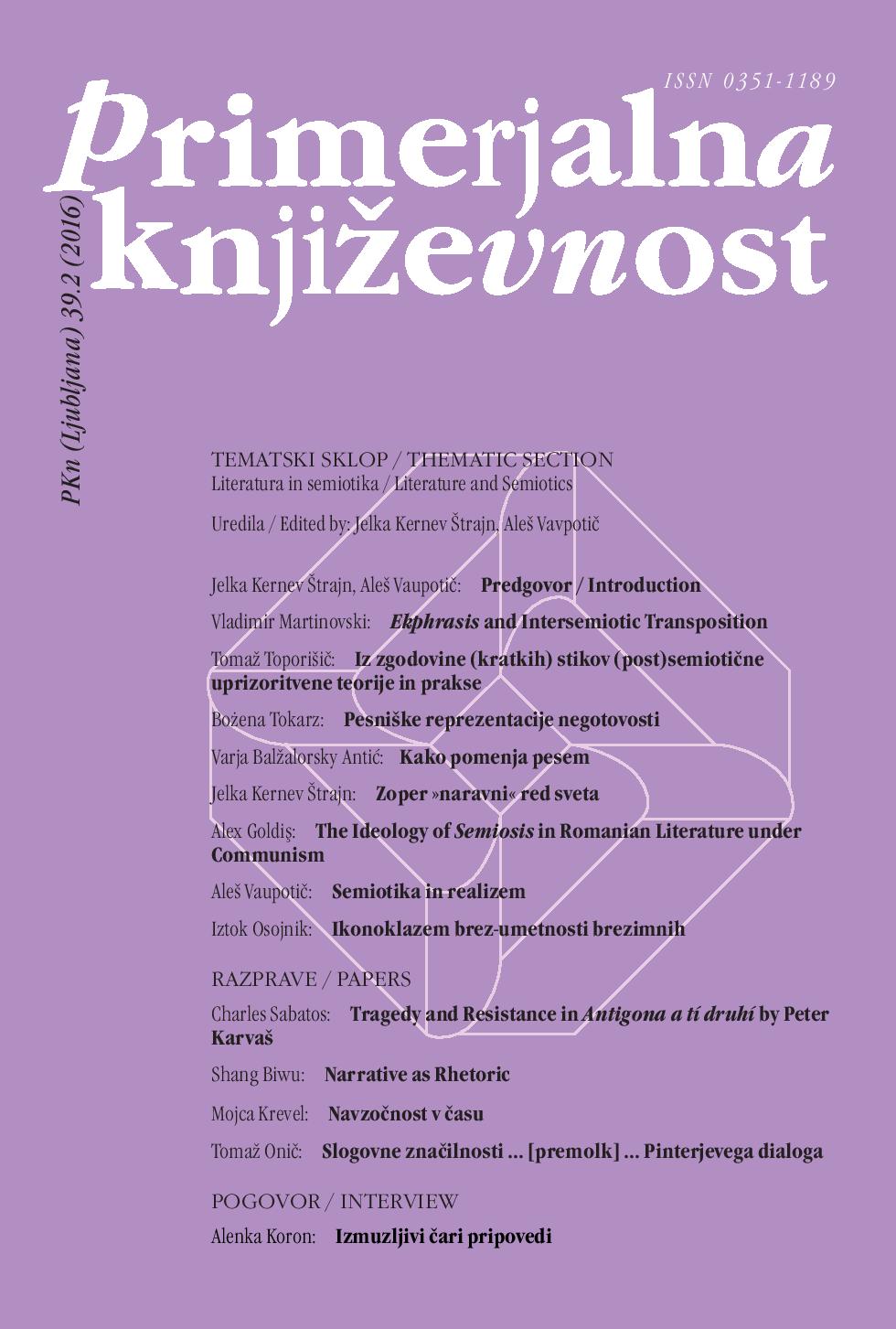Ideologija semioze v romunski prozi pod komunizmom
Ključne besede:
literatura in ideologija, romunska književnost, komunizem, cenzura, metafikcija, postmodernizem, ezopski jezik, semioza, subverzivnostPovzetek
Članek raziskuje romunska literarna gibanja osemdesetih let dvajsetega stoletja v luči njihovih povezav s poetiko novega romana in literarnoteoretskimi inovacijami skupine Tel Quel. Poleg novih tehnik pisanja, ki so nadomestile mimesis s semiozo na področju literarne produkcije, so skušali literarni avtorji, ki jih povezuje ime »tekstualizem« (Dumitru Ţepeneag, Gheorghe Crăciun, Mircea Nedelciu ali Gheorghe Iova so samo nekateri od predstavnikov), vzpostaviti protiutež uradni literaturi Ceaușescujevega režima. Besedilo pregleduje osrednje subverzivne strategije, ki jih vsebuje semiotični pristop k literaturi. Dekonstruiranje ideološkega okvira, skritega pod poetiko realizma, je bil glavni cilj, ki je bil tako podlaga precejšnjega števila ideoloških argumentov in literarnih postopkov. Poudarek na »prosti igri« lingvističnega znaka (sledeč derridajevskim principom), razsrediščenje enoglasne pripovedne perspektive ali vztrajanje pri avtoreferenčni naravi jezika, vse to je omajalo uradni pristop k literaturi. Ideja literature kot odprte semioze, ki vzpostavi demokratičen odnos med avtorjem in bralstvom, je bila glavni dosežek romunske tekstualistične skupine. V sklepu razprava ponudi premislek o ideoloških protislovjih gibanj, ki so se navdihovala pri semiotiki. Skupina Tel Quel sicer temelji na neomarksistični doktrini, toda v vzhodnoevropskem kontekstu so se njeni principi usmerili zoper socialistične totalitarne režime.Literatura
Annus, Epp, and Robert Hughes. “Reversals of the Postmodern and the Late Soviet Simulacrum in the Baltic Countries.” History of the Literary Cultures of East-Central Europe. Vol. 1. Ed. John Neubauer and Marcel Cornis-Pope. Amsterdam: John Benjamins, 2004. 54–65.
Barthes, Roland. Critical Essays. Illinois: Northwestern University Press, 1972.
Brown, Deming Bronson. Soviet Russian Literature Since Stalin. Revised edition. Cambridge: Cambridge University Press, 1979.
Chitnis, Rajendra A. Literature in Post-Communist Russia and Eastern Europe. The Russian, Czech and Slovak Fiction of Changes. London: RoutledgeCurzon, 2005.
Clark, Katerina. The Soviet Novel. History as Ritual. Chicago: University of Chicago Press, 1981.
Crăciun, Gheorghe. “Autenticitatea ca mod de lucru.” Competiţia continuă. Generaţia ‘80 în texte teoretice. Ed. Gheorghe Crăciun. Piteşti: Paralela 45, 1999. 267–272.
Cornis-Pope, Marcel. “Self-Referentiality.” International Postmodernism. Ed. Hans Bertens and Douwe Fokkema. Amsterdam: John Benjamins, 1997. 257–265.
Culler, Jonathan. Structuralist Poetics. Structuralism, Linguistics and the Study of Literature. London: Routledge, 2002.
Diniţoiu, Adina. Proza lui Mircea Nedelciu. Puterile literaturii în faţa politicului şi a morţii. Bucharest: Tracus Arte, 2011.
Erofeev, Viktor. “Pominki po sovetskoi literature.” Literaturnaia gazeta 6 July 1990: 8.
Federman, Raymond. “Self-Reflexive Fiction.” Columbia Literary History of the United States. Ed. Emory Elliott. New York: Columbia University Press, 1988. 1142–1157.
Goldiş, Alex. Critica în tranşee. De la realismul socialist la autonomia esteticului. Bucharest: Cartea românească, 2011.
Kauppi, Niilo. The Making of an Avant-Garde: Tel Quel. Berlin: Mouton de Grutyer, 1994.
Krasztev, Peter. “Quoting Instead of Living: Postmodern Literature Before and After the Changes in East-Central Europe.” History of the Literary Cultures of East-Central Europe. Vol. 1. Ed. John Neubauer and Marcel Cornis-Pope. Amsterdam: John Benjamins, 2004. 70–83.
Martin, Mircea. “Postmodernism şi avangarda literară.” Revista filosofică 45.2 (1998): 241–246.
Nedelciu, Mircea. Efect de ecou controlat. Bucharest: Cartea românească, 1981.
– – –. “Nu cred în solitudinea absolută a celui care scrie. Interview by Gabriela Hurezean.” Scînteia tineretului. Supliment literar-artistic 14.341 (1988): 3.
Negrici, Eugen. Literatura română sub comunism. Proza. Bucharest: Editura Fundaţiei Pro, 2006.
Neubauer, John, and Marcel Cornis-Pope, eds. History of the Literary Cultures of East-Central Europe. Vol. 1. Amsterdam: John Benjamins, 2004.
Pavel, Laura. Dumitru Ţepeneag şi canonul literaturii alternative. Cluj-Napoca: Casa cărţii de ştiinţă, 2007.
Perian, Gheorghe. Pagini de critică şi de istorie literară. Târgu-Mureş: Ardealul, 1998.
Potapov, Vladimir. “Na vykhode iz ‘andergraunda.’” Novyi mir 10 (1989): 251–257.
Roberts, Graham. The Last Soviet Avant-Garde. OBERIU – Fact, Fiction, Metafiction. Cambridge: Cambridge University Press, 2006.
Terian, Andrei. “The Rhetoric of Subversion: Strategies of Aesopian Language in Romanian Literary Criticism Under Late Communism.” Slovo 24:2 (2012): 75–95.
Ţepeneag, Dumitru. “Autorul şi personajele sale.” Viaţa românească 20.5 (1960): 128–130.
Waugh, Patricia. Metafiction. The Theory and Practice of Self-Conscious Fiction. London: Routledge, 2001.


